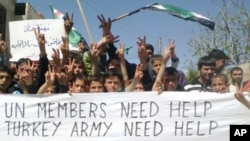A cease-fire in Syria showed more signs of unraveling on Friday, as security forces fired shots at protesters and pounded opposition strongholds while the government blamed rebels for a deadly explosion. The Syrian opposition also held anti-government protests in several towns and cities.
Syrian government troops pounded at least three districts in the flashpoint city of Homs Friday, despite an eight-day-old ceasefire. Government tanks and armored personnel carriers also reportedly stormed one neighborhood of Daraa and surrounded a town south of Homs.
Opposition activist Hani Abdallah told Arab satellite channels that the situation inside Homs is desperate, as food, water and medical supplies have run short. He said some of the wounded are dying of gangrene due to a lack of doctors and medicine.
In a visit to the southern city of Daraa, Moroccan Colonel Ahmed Himiche, who heads the U.N. observer team, spoke with a rebel soldier, who told him the government is not observing the cease-fire.
He says that the town of Qasri was shelled and no one from the media was there to report on it. He added that 60 people are missing from one town.
State-run media reports say an explosion killed 10 security force members near the Golan Heights region. The government blamed "armed terrorists" for the attack.
Despite the cease-fire, the Syrian government has said it has the right to respond to attacks.
Rebel leader Mustafa al-Sheikh, who heads the Higher Military Council of the Free Syrian Army, urged countries sympathetic to the rebels to form a military alliance with the rebels to help topple the government:
He asked foreign governments friendly with the opposition to form a joint military alliance outside of the U.N. Security Council to conduct surgical strikes against the regime to prevent further bloodshed and restore stability in Syria.
Despite the ongoing violence, thousands of opposition protesters took to the streets of several Syrian towns and cities.
Khattar Abou Diab, who teaches political science at the University of Paris, said that the Syrian government has been unable to regain control over of the country, creating what continues to be a stalemate.
He said that President Bashar al-Assad is using force, like his father did in 1982, to remain in power. He added that despite reliance on his two most powerful and loyal military units, Mr. Assad has failed to subdue the opposition stronghold of Homs and other flashpoint areas.
The U.N. Security Council is considering a plan that would increase the number of international monitors in Syria from about 30 to 300.
A U.N. spokesman described the cease-fire as "very fragile." He expressed hope that additional monitors would be in place in Syria very soon.
| Join the conversation on our social journalism site - Middle East Voices. Follow our Middle East reports on Twitter and discuss them on our Facebook page. |




